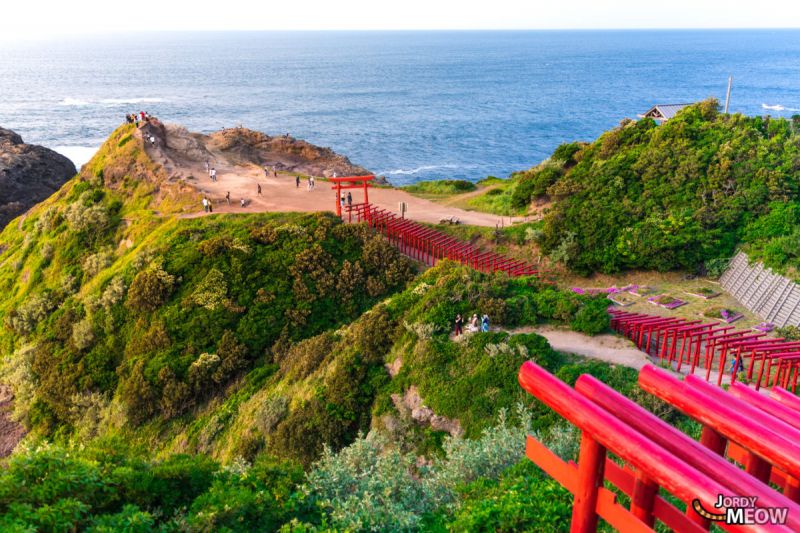
Photo by Jordy Meow
Motonosumi Inari Shrine
In 1955, a divine message was sent from the fox spirit to a local resident of Nagato, Yamaguchi Prefecture. He was told to build a shrine on the picturesque cliffs where he went fishing. This is the story locals tell when asked about the origin of the Motonosumi Inari Shrine.
Often described as breathtaking, the secluded shrine on the coast of Yamaguchi boasts 123 torii gates. They are all lined up along a footpath leading to the shrine. Most of the gates originally came from its sister shrine; Daikondani Inari Shrine in Shimane prefecture. The path stretches over 100 meters and is said to bring good luck in fishing, business, travel and pregnancy.

Torii tunnel (Photo by: Akira Takiguchi)
What really sets this shrine apart is the offertory box where traditionally you throw a coin in to make a wish or ask for luck. Normally set upon the ground, this shrine’s box is attached to the top of the first torii gate on the path. Patrons have to throw their coins at the box, hoping it will go in. If your aim is true and your coin does go in then your wish is said to come true.

Photo by: Bsx The rocky cliffs of Omijima.
Along the cliffside next to the shrine you get a gorgeous view of the ocean. The rock face of the cliff is riddled with grooves and holes created by weathering. This is particularly impressive when the waves crash against the cliff face, forcing water through the largest of these holes, creating a geyser-type effect. This is called the Ryugu no Shiofuki, or dragon palace geyser as it is said to look like a mythical water serpent emerging from the ocean.
The reflective pools [of the rice paddies] next to the intensely blue ocean make for quite the sight.
Further along the coast, there are sights such as Omijima or “the Alps of the sea.” These are a small island chain made up of gargantuan rocks violently jutting out of the water. You can take a cruise ship around these natural formations or see them from beneath along with the locally famous senzaki squid on a diving trip.

Photo by: Yuri Ueno A farmer in the Higashi-ushirobata Rice Terrace.
Also close-by are the reflective rice fields of Nagato. From the top of Yuya terrace, you can look down up the layered rice fields. Each one is on a different step, leading down to the ocean. Another terrace just a six-minute drive from there is Higashi-ushirobata Rice Terrace.
The reflective pools next to the intensely blue ocean make for quite the sight. On a clear night, the pools reflect the stars and the only artificial lights that can be seen are the squid fishing boats bobbing to and fro in the waves. The pools, ocean and night sky all mix in a sea of speckled lights, brightening the darkness.

Leave a Reply